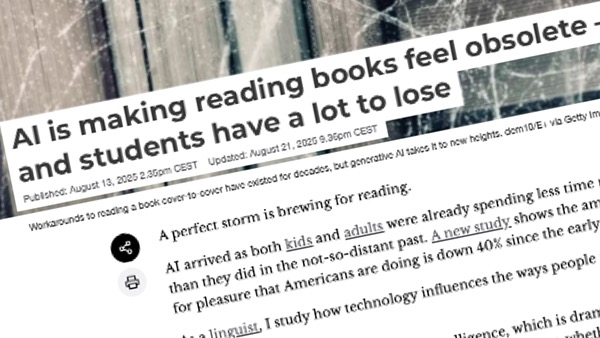For the last three years, the GSR Foundation, which I lead, has organised events and conducted training sessions to integrate AI into the publishing industry. In parallel, we wanted to understand the impact of digital technologies on reading skills, especially in the two younger generations – Gen Z and Gen Alpha.
That is why we asked Naomi Baron, who holds a PhD from Stanford and is a renowned researcher on language skills [and was a speaker at the International Publishers Congress in Jakarta in 2022, Ed.], to share her thoughts on this subject at LECTURALAB in 2024. As a professor at Brown University, she has consistently conducted research on topics connected to language and technology, such as the impact of computers on communication, language use in the digital age, and the use of Facebook in online social interactions among American college students.
Following LECTURALAB we designed some experimental initiatives and modified some projects to adapt them to a situation where many people have opted to let AI tools take care of things. We stayed in touch with Prof. Baron and I was fascinated when she told me that the event and some of the informal conversations there influenced an article she had published and a new book.
Her upcoming book, Reader Bot: What Happens When AI Reads and Why It Matters (Stanford University Press, release January 2026), gave us the opportunity to talk about some aspects that caught my attention. First, we discussed the impact of AI on the decline of reading for pleasure, with Prof. Baron concerned that AI’s ability to read for us will undermine our sense that reading, even writing, is worth it: “Those who enjoy reading will, presumably, continue to read for pleasure, but what about reluctant readers? What about lapsed readers who have gotten out of the habit? As we cede increasing proportions of mandatory reading to AI, I worry that we will increasingly find doing the reading ourselves […] to be a less natural and less valuable endeavour”.
On the long-term impacts of allowing AI tools to read for us, Prof. Baron argued that: “Empirical research, plus cascading observations from smart, educated people, suggests that heavy reliance on AI to think for us threatens our own cognitive abilities. That goes for reading, but also more generally for problem solving, creativity, and such. Thinking is a skill, and like other skills, benefits from practice. What is more, unless we can think for ourselves, how can we judge whether what AI produces is right or wrong? And what happens if AI is not available? I used to ask my students, what do you know when the internet is down? Now I ask, ‘What problems are you able to solve, what are you able to write, what written work are you able to analyze when your favorite LLM isn’t accessible?’”.
Baron also shed light on the reasonable use of AI in our lives as readers or professionals: “People grapple with balancing challenges in so much of their lives. Should you walk or drive (the former better for your health but demanding more effort)? The same goes for taking the elevator or the stairs. Should you eat that extra croissant when your diet plan says no but your eyes say yes? The personal tussle is often between will power and rational decision-making. Faced with the same dilemma, we don’t all make the same choice. That goes for walking, eating croissants, and choosing whether to do the reading (and thinking) ourselves or hand over the task to AI. What matters in all these instances is to remain aware that choices have consequences. We need to clarify our own goals and remind ourselves of them when temptation strikes”.
Finally, I cannot resist the temptation of including a very inspiring thought about stimuli when reading that was shared by Prof. Baron: “When I think about AI and reading, my concern isn’t its impact on PISA, PIRLS, or NAEP rankings. Rather, I care about unlocking the benefits of reading in their full array. That includes reading for enjoyment, for escape, to share in the worlds of others, not just learning information or sharpening our abilities to analyze, criticize, and think. Yes, the latter trio is important, but we shouldn’t neglect the first cluster. I’m reminded of a colleague who runs a writing poetry project in prisons for inmates on death row. You might ask how such individuals could be convinced that writing poetry is a worthwhile endeavour, but they are and do. Literacy – both reading and writing – brings personal rewards entirely separate from statistically measurable outcomes. If we can convince children that reading is its own reward, heightened reading skills can hopefully follow”.
Now is an excellent time to ask whether cognitive skills, which risk being weakened by our increasing reliance on AI to read, remain relevant or whether their loss represents a cost for younger generations.

